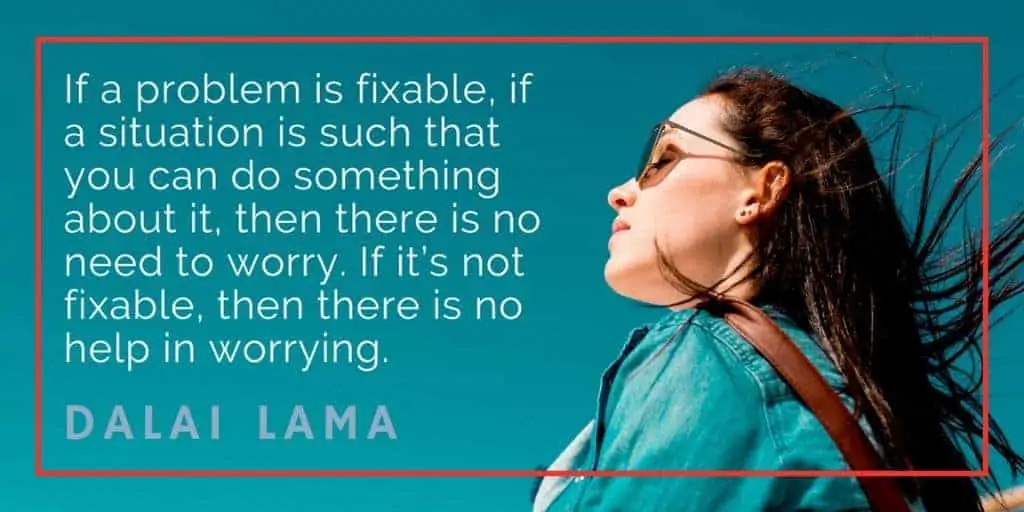Today's Thursday • 10 mins read
— Researched and written by Dr. Catherine Cirulli.
Can you choose happiness? Optimists would say yes, and science would agree.
They see the bright side, embrace the present, and believe in themselves and others. When troubles arise, they face them head-on, knowing they can find a way through.
Now, the good news is that this optimistic outlook is a skill you can cultivate with practice.
So, let’s learn to navigate life’s unpredictable twists and turns with an optimistic approach.
5 Ways To Be More Optimistic
Each strategy closes with a phrase that captures the concept. Repeat each phrase in your mind for the next week and see your optimism and happiness levels rise.
Here are the five tips on how to be more optimistic:
1. Seek opportunities in challenges.
Embrace the Growth Curve:
Forget “dread the deadline,” reframe it as a “growth curve launchpad.”
Every challenge is a chance to climb steeper, learn faster, and surprise yourself. Seeing obstacles as opportunities to rise above, not walls to be blocked by, is the fuel of optimism.
So, take that presentation, that new client, that test, and turn them into springboards for your confidence and skills. Remember, worrying won’t change the situation, but your perspective can change everything.
Flip the Script on Stress:
Imagine turning nervous butterflies into excited fireflies! That’s the magic of choosing optimism.
Instead of letting stress dim your shine, see it as the adrenaline rush you need to conquer your goals.
Think of that upcoming challenge as a chance to unleash your inner hero, showcasing your talents and leaving a lasting impression.
Remember, your thoughts hold the power to rewrite the narrative. Choose wisely and flip the script on stress to unleash your best self.

Plant Seeds of Possibility:
Don’t let challenges wilt your spirit. See them as fertile ground for planting seeds of possibility.
That looming presentation? It’s an opportunity to blossom into a confident communicator. That first client meeting? A chance to cultivate a fruitful relationship.
Every obstacle holds the potential to bloom into something beautiful when you nurture it with an optimistic mindset.
So, shift your focus from the thorns to the possibility of roses, and watch your resilience blossom.
Spark the Joy Spark:
Life throws curveballs, but optimism throws curveball catchers. It’s the secret sauce that adds a spark of joy to even the driest deadlines and trickiest tests.
How? By reframing anxieties into exciting adventures. That presentation becomes a platform to share your passion. That new client meeting is a chance to connect and grow.
Remember, it’s all about perspective. Choose the one that ignites your joy spark and watch challenges light up your path, not dampen it.
Here’s a statement to help you change your perspective and be more optimistic:
I realize that every challenge has an inbuilt opportunity.

2. Practice feeling blessed and having gratitude.
Cultivate the Gratitude Garden:
Ever stop to smell the roses, not just for their fragrance, but for the miracle of their existence? That’s the essence of gratitude – appreciating the little things that are often overlooked.
And guess what? This simple shift in focus can blossom into a garden of optimism and happiness. It’s like watering your happiness seed with gratitude every day.
When you start actively seeking things to be grateful for, no matter how small, your entire perspective shifts. Suddenly, worries fade into the background, replaced by a warm glow of appreciation.
So, plant a seed of gratitude today, and watch your happiness bloom.
Rewrite the Happiness Script:
Imagine negative thoughts like weeds choking your inner sunshine. Gratitude is the weed-whacker, clearing the negativity and letting your happiness shine through.
When you make a conscious effort to appreciate the good things, big or small, it’s like writing a new script for your day.
Suddenly, the annoying coworker becomes a source of amusement, and the traffic jam is an opportunity to catch up on your podcast. It’s all about redirecting your focus from “Why me?” to “Wow, I’m lucky!”
Give this script rewrite a try – you might be surprised at how vibrant your happiness becomes.
Gratitude Glasses: See the World in Sparkling Light:
Remember those rose-colored glasses people talk about? Gratitude is like putting on a pair of sunshine-tinted lenses, transforming the world around you.
By acknowledging the blessings in your life, no matter how ordinary they seem, you start noticing the sparkling details you may have missed before.
The chirping birdsong, the warmth of the sun, the smile of a stranger – all become miniature celebrations. This shift in perspective not only fuels optimism but also strengthens your resilience.
Suddenly, challenges seem less daunting when you have a heart full of gratitude. So, put on your gratitude glasses and rediscover the magic in the mundane.
The Gratitude Chain:
Think of gratitude as a beautiful chain, each link forged with appreciation.
Every time you acknowledge something you’re grateful for, you add another link, making the chain stronger and brighter.
This act of appreciation not only lifts your own spirits but also ripples outward, affecting those around you.
When you express gratitude for a colleague’s help, you strengthen your bond. When you thank your child for a hug, you nurture their empathy. This gratitude chain becomes a powerful tool for spreading happiness and optimism, making the world a brighter place, one link at a time.
Try this exercise: Every night before going to bed, write down 2-3 things you’re grateful for, for at least a couple of weeks.
Here’s a statement to help you to practice gratefulness and be optimistic:
I have an attitude of gratitude. I feel blessed to have the things that many others do not.
3. Sleep well and full 8 hours each night.
It’s not uncommon for me to meet new clients who don’t know why their mood is low, only to discover that they’re barely sleeping five or six hours a night, or even less.
Good sleep has a direct impact on mental health.
And a lack of sleep can cause mood instability, including anxiety, restlessness, and impulsiveness.
Get eight hours of sleep each night. Don’t try to make up for lost sleep during the week by oversleeping on weekends.
Getting enough sleep works in the background during your waking hours to improve your productivity, focus, mood, and optimism.
Here is a statement to help you remember to prioritize your sleep habits and be optimistic:
I sleep well at night to be well during the day.
4. Focus more on the positives in your life.
Life is full of ups and downs. It is important to focus on the positive rather than getting caught up in the negative.
If you’re looking for the positive, that is what you will see. The positive, not the negative, will be what gets your attention. If you tend toward the negative, the negative is what you’ll see.
How to be an optimistic person? Here is a great exercise.
Make a list of 10 positive things that have happened in your life. Start from when you were a child, and write down 10 great things you can think of until the present day.
While making the list of positive things, try not to judge anything that you wrote there. Just write any positive thing that comes to your mind.
Your positive events may include experiences you enjoyed, supportive people in your life, successful accomplishments, nice things someone said about you, cool things you’ve learned, places you visited, or a great service you did for someone.
Some specific examples could be:
- I had a wonderful teacher in 1st grade.
- When I was fifteen, I got an A in algebra.
- My grandpa and I would go fishing when I was a kid.
- We had a great dog when I was ten. We loved each other so much.
- In second grade, my team won a contest at school and I was instrumental in it.
Your accomplishments and positive experiences may be unique or commonplace. Make your list and then read it every week as a reminder of the good things that have happened in life.
By the way, that “10 Positive Things” exercise also happens to be one of my favorite exercises to suggest to my clients.
However, don’t force positivity at the cost of ignoring the critical negatives. Find out how “Toxic Positivity” can ruin your life (and how you can avoid it).
Here’s a statement to help you focus on the positive and be optimistic:
When I look for the good, I find it easy to see them.
5. Believe in yourself
A firm self-belief is how you become positive, happy, and optimistic.
True optimism is not the same as being blind to the problems and obstacles that life presents. Optimism is rather about believing you can handle the challenges of life.
To clients who present to me with anxiety or intense worry over a situation, I ask: “What’s the worst thing that can happen?”
And then, “Can you handle it? If you believe you can handle it, then there’s nothing to fear.”
According to Martin Seligman, a pioneer in the field of Positive Psychology, most people end up handling adverse events better than they think they will.
So, rather than having a false belief that you cannot handle something, believe that you can handle it at the outset, and then prove yourself right.
If you do this, you can let go of a lot of worries and live your life in peace. Because now you feel confident in your ability to get through almost anything. And believing in yourself is a wonderful and freeing feeling.
For practice, think of an adverse experience that you handled well. Draw upon this experience when you’re going through something hard, and use it to remind yourself that you can handle this new situation, too.
Here’s a statement to help you to believe in yourself and be optimistic:
I’m capable and resilient.
Final Words
Having an optimistic attitude is a choice you can make right today. Start with the five tips above and repeat the Optimistic Statements to help reinforce them.
Let’s close this with a few quotes on optimism:
- The only person you are destined to become is the person you decide to be. — Ralph Waldo Emerson
- The greatest glory in living lies not in never falling, but in rising every time we fall. — Nelson Mandela
- Optimism is the faith that leads to achievement. Nothing can be done without hope and confidence. — Helen Keller
- An optimist is the person who laughs when it rains. A pessimist is the person who complains if it’s sunny. — Unknown
- The optimist sees the opportunity in every difficulty. The pessimist sees the difficulty in every opportunity. — Winston Churchill
- Hope is the thing with feathers that perches in the soul, and sings the tune without the words, and never stops at all. — Emily Dickinson
√ Also Read: 10 Greatest Happiness Hacks From Positive Psychology
√Please share this with someone.
» You deserve happiness! Choosing therapy could be your best decision.
...
• Disclosure: Buying via our links earns us a small commission.
